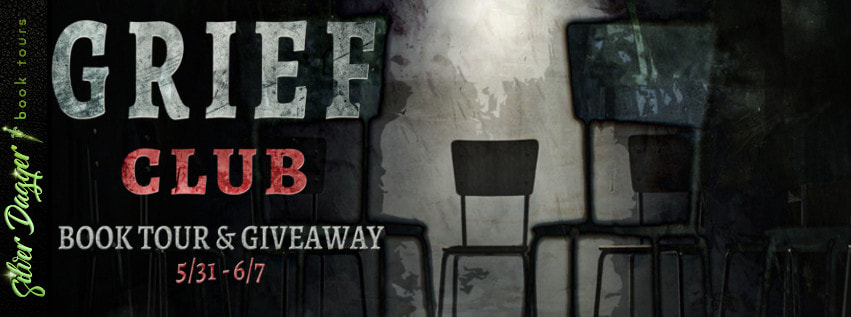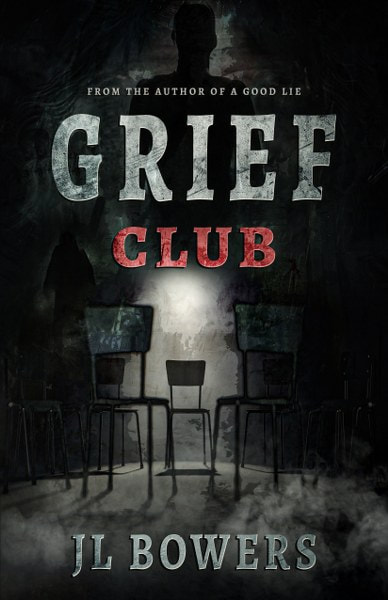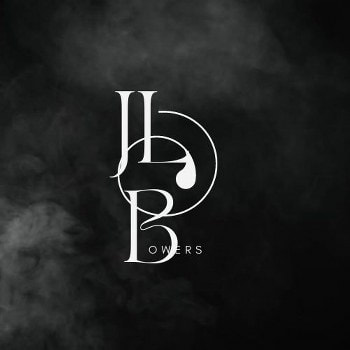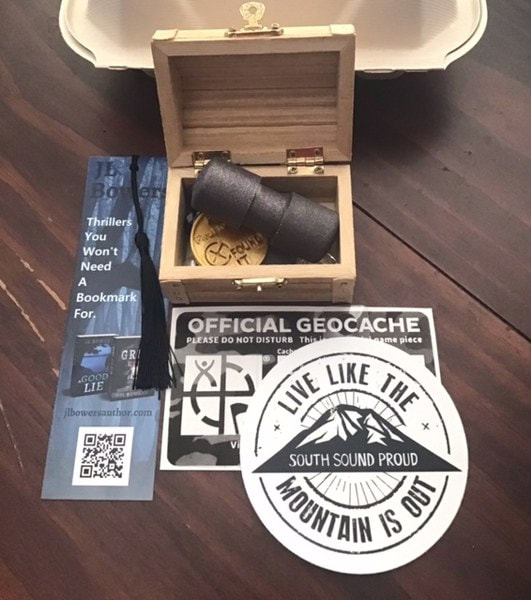
His phone dinged from the counter.
Kate shot it a wary glance. “Your sister?”
“Probably. She texted earlier.”
“You don’t have to go over there again, do you?”
Kate’s eyebrows were raised in something not quite a frown, and faintly judgmental. Damian bristled. They’d moved to Tacoma not long after his parents’ death so he could support his sister who was struggling with the loss, and also with her marriage, its problems amplified by that loss. Kate, a Seattle native, underestimated how much she’d miss the city and wanted desperately to move back, but Damian didn’t feel his sister was ready for him to leave. Kate outwardly supported his devotion, but Damian felt her impatience every time his phone buzzed.
“She just sent me coordinates, is all. She’s geocaching again.”
“That’s a good sign, isn’t it?” Kate said. “That she’s playing games? And the last time she was over here, she seemed happier!”
***********
His features creased in understanding, and he nodded. They stood there a minute, him staring at his shoes, she at the stone pile.
“What’re you doing in there?” she finally said.
“Do you know what geocaching is?”
She didn’t, and he took the time to explain it—the game where people punched in coordinates on a website, advertising where they’d hidden containers full of stuff, and then other people would use their GPS devices to try and find that stuff. The containers were referred to as caches. Apparently, there was a big global treasure hunt going on, and Jess had never heard of it.
“What’s inside the caches?”
He shrugged. “Depends. Most have a logbook that you sign to prove you found it, but after that it varies. Usually there’s little trinkets like toy cars or buttons—small, hokey stuff like that.”
“So nothing valuable?”
“No. Well, sometimes. One had a disposable camera inside so you could document your visit. It really depends on the size of the cache.”
“And there’s one in there? In the stones?”
He nodded, his gaze returning to the pile. “Or somewhere close. When I got here, my phone dinged with an alert, telling me a cache was nearby. I’ve been looking for ten minutes, but I still haven’t found it.”
“Maybe someone took it.”
“Could be. That happens sometimes. But generally, if you take something, you leave something.”
She walked over, her eyes roving all over the planter. She had no idea what she was looking for.
“Weird,” he said, running a hand through his hair.
“What?”
“This whole thing. I thought I’d turned my alerts off.” His gaze turned reflective, almost mystic. “Maybe it’s a sign.”
Jess turned aside, eyes half-rolling. Signs weren’t anything she believed in. Her gaze drifted to something shiny under the azalea plant, but on closer inspection, it turned out to be just a gum wrapper.
“What do these things look like anyway?”
“It varies. The container can be anything—a shoebox, an Altoids box, a fake bolt.”
Her brows lifted at the fake bolt. This was a strange hobby. He mistook her look for interest.
“Here, I can show you.” He scrolled on his phone. “There’s a cache just down the”—he frowned—“huh?”
“What?”
“Looks like it’s not there anymore.” He tapped at his screen. “And there’s nothing else within walking distance. I do know where there’s a bunch of them, if you really wanna see one.” He looked at her. “It’s a fifteen, maybe twenty minute drive, but worth it...”
***********
It loomed over the coffee table, a colossal mound of evaded reality, as imposing as the majestic Mount Rainier. Jess had dubbed it Mount Correspondence, and tackling it seemed just as insurmountable as Rainier.
Her hand shoved into the heap, drawing an envelope out like it was a winning raffle ticket, but she sucked in a breath when she saw what she’d won. A condolence card. These were insurmountable. A box to her right was crammed with them, along with other potential emotional landmines. She was about to toss the card in with the rest when the name of the sender caught her eye.
************
He thumbed the empty space on his left ring finger. Kate had noticed the ring’s absence immediately, drawn by the scrapes on his swollen hands. Recognizing them as brawl wounds, she’d slapped Neosporin and gauze down on the table, letting him tend to his own injuries while he explained himself. He managed to get to who and how much damage, but not why, as Kate’s eyes had gone wide, and she snatched the first aid kit from the table and left. His own Clara Barton—Angel of the Battlefield—off to triage his mess.
Hours later, in his darkened office, he heard the front door creak open. He half-expected it to be the police, but then Kate materialized in his doorway. She didn’t say a word, just shoved another Grief Club pamphlet in his hand, tossed a blanket and pillow at him, and stalked away. He leapt up and trailed her down the hall. When they reached their room, she turned, her expression wary, but he lost his nerve and didn’t argue. Neither did Kate. She just looked at him as if she’d discovered a new variety of rodent and was afraid it would infest her soul.
He slept on the sofa that night, and for several nights after.
***********
The picture was of a gangly teenager in a black knit dress—Jess at age thirteen, wearing a tentative smile, the innocence of it betrayed by her pale, bleak eyes. The photo, a candid shot, had been captured by a professional photographer on the day of her father’s funeral. Jess remembered the day like it was yesterday—the tears, the pain, but mostly the anger. Anger directed at her mother who’d flounced around the reception, handing out hors d'oeuvres and flirting with the partners from her father’s law firm like an aspiring grande dame instead of acting like a proper widow. Jess had watched the spectacle from midway up the stairs, head tucked between balusters, alone in her grief. The loneliness threaded through the rest of her life, persisting no matter how many friends she made or how popular she later became in high school.
***********
He looked skyward and breathed a heavy sigh, but the heavens held no answers for him. It was a typical Tacoma sky—dark and ominous, but impotent as a blustering drunk, threatening the city with rain but lacking the will to unleash it.
***********
Damian exhaled a few short huffs, working to corral the adrenaline shooting through his veins. It was not lost on him that he was acting a bit like the junkies Elton’s crew served. He forced himself to still, to breathe deeply. The pursuit of justice was like BBQ, he reminded himself. It took time to prepare, the food thick with artery-clogging trimmings, but oh how the meal would be worth it.
He smirked. Or maybe, having not eaten all day, he was just hungry.

What are you passionate about these days?
I’m really excited to be working on my third novel, yet to be titled, that I’ve decided to write in the first person instead of in third person like my first two novels. The main protagonist will be male, and in another first for me, the book will be part of a series.
What do you do to unwind and relax?
Music, reading, and gaming. Sometimes TV.
Do you have a favorite movie?
No. I could never pick just one. But the top three movies for me, I guess, would be the Star Wars trilogy (ORIGINAL!), Casablanca, and Field of Dreams. Yes, they are older, and I know I’ve enjoyed many recent films, but nothing I would classify as a favorite. I have also been more into long form story telling—like television series—for the past few years rather than film. That might be a byproduct of the pandemic. With the lingering uncertainty, there’s something comforting about seeing the same faces each week.
Which of your novels can you imagine made into a movie?
All of them. Ha ha. This is not a question to ask a writer and expect a humble answer. I don’t think there’s an author out there who hasn’t imagined their book translating to the screen. But if I were to pick one from my small catalogue, I would say my first book A Good Lie seems the least complex to portray and the most marketable.
Do you have any “side stories” about the characters?
(This answer contains a spoiler). In my book Grief Club, I knew Damian’s wife Kate was pregnant much earlier than I reveal in the book. She was keeping it from him until he straightened himself out. I even wrote a chapter where Damian discovers her secret, and this discovery was supposed to be behind his epiphany, and the reason he raced home (where I needed him to go for plot reasons). But the chapter didn’t fit into the pacing of the story, so I snipped it out, settling for a mention at the end of the book instead.
How did you come up with the title of the book?
Ha. I didn’t work too hard for this one. It’s based on the name of the support group in the story, of course. But I thought it somewhat defined the book without giving away too much of the plot. And while it’s a little strong to say I was inspired by David Baldacci’s Camel Club, it also didn’t hurt to see my titling choice modeled in a big name author’s book.
Who designed your book covers?
My book covers are collaborative. Meaning, I spend hours searching for images online that I think best captures the themes of my books, and then I send the best of those images to a cover creator on Fiverr who turns them into something cover-worthy. Initially, I did my own cover for my first book A Good Lie, using Paint.net—a free Photoshop type program—and my rudimentary skills in graphic design. I was struggling financially at the time and didn’t feel I could afford to pay someone to make my cover. It was an okay effort (you can still see this effort on Goodreads, as they don’t remove previous versions of books.), but I was never completely happy with it. So when Grief Club was ready for release, I decided to update A Good Lie as well. I sent the files to the designer—a talented Ukrainian woman—and she did a wonderful job turning my amateur effort into something more professional. Oddly, she didn’t design the Grief Club cover. When I needed that cover made, she was my first choice, but she happened to be on vacation at the time. In my impatience, I used a different designer. It worked out okay, except there were formatting issues I was having trouble getting fixed. So I sent her my files a few months later, at the last minute, and she fixed it right up. She ended up designing the title and the text on that one.
Cover design is my favorite and also least favorite part of the publishing process. I’m a visual person so my creative side loves picking out the photos, and there’s a rush when I find the perfect image for my book. I usually have no trouble envisioning how I want the cover to look. But it can be really difficult translating your vision to someone else and having them make that vision in time for your planned release. Each revision takes time, and also Amazon has different design requirements than IngramSpark. If you design your cover too early, when your manuscript isn’t ready, it can be costly to adjust it. That said, I feel I’m on the downslope of the learning curve in cover creating, and my next cover should go much easier.
Did you learn anything during the writing of your recent book?
I always learn something when I write my books. I research extensively when I outline, and continue to research during the writing phase. What I learn through that research is often incorporated into my books. Kate, Damian’s wife in Grief Club is a nurse. I learned through researching nurses that many of the things we see on television about nursing aren’t really true. Like the trope where a defibrillator is used to bring a dead patient back to life. In real life, a flat-lined patient would not be shocked into a heartbeat. The defibrillator is meant to normalize an existing heartbeat, not restart the heart. I found this fact to be so interesting, I wrote a scene around it. Whenever I find a nugget like this, it revs me up, gets my creative juices flowing, and also adds needed color to a story.
How long have you been writing?
I started writing my first novel A Good Lie sometime around 2012. I had previously tried my hand at screenwriting and had produced a script sometime around early 2001. I shopped it to one or two people, got good feedback from a manager and a script supervisor friend of mine, but ultimately decided against going all in with that medium. It took all I had to write that script, I didn’t have the heart or desire to deal with the multiple rewrites that I knew would be required by producers and anyone else with creative control, assuming it ever got bought in the first place, of course. I am a terrible salesperson, and three-quarters of success in Hollywood is selling, whether it’s yourself or your product. Me? I couldn’t sell coffee to a caffeine addict.
It was actually my script supervisor friend who suggested I write a book—more accurately, she suggested I turn the screenplay I’d written into a book. At the time, I didn’t think I could do it—write a novel. Scripts are lean and low on filler. They rely on dialogue and short beats of action. A novel with all its required detail seemed way harder, lol. It took me almost a decade to decide to give it a go, and now I don’t know that I could go back to writing scripts. Also, self-publishing really fits me. I love not having to change things in my work to satisfy someone else’s whim. My books are written the way I want with no considerations to budget, or talent (actors), or anything except what I want them to be.
By the way, I never turned my screenplay into a book. And I don’t think I will. But I was glad for the experience. It helped shape me as a writer.
Do you read yourself and if so what is your favorite genre?
Oh yes, I read. I don’t know if I could write if I didn’t read. I’ll pick up anything except romance. No offense to those who love it; it’s just not for me. My favorite genre is the one I write in: thriller, mystery, suspense. It’s almost addicting, the page-turning aspect of it. Maybe my brain is predisposed to needing the adrenaline rush or something, I don’t know, but I love being on the edge of my seat. That said, no matter the genre, I love a book with creative, elegant prose. If the author can turn a phrase, it’s as rich and satisfying as savoring a five course meal made by an Iron Chef.
Do you prefer to write in silence or with noise?
Silence. I’m not as productive if I sit in a coffee shop or some other public place. But if my brain is broken and I need a jolt, sometimes I’ll put on some classical music.
Pen or typewriter or computer?
Computer. Oh, boy, I don’t have the patience to handwrite. And typewriter? Well, that’s just archaic, lol. And wasteful. My rewrites would kill a forest.
What makes a good story?
The right balance of plot, character, and description. I don’t want to read a book or watch a TV show with a great plot but stiff, clichéd characters and bad description. Many action movies fall into this trap. I also don’t want to read a book that’s all character and location descriptions but doesn’t go anywhere or do anything. I find them boring, like Vanilla Sky boring. And ease off the technical stuff. I don’t enjoy Tom Clancy as much as other thriller authors because he writes too technical for me. I don’t want to read five long paragraphs describing warship specs. There are exceptions, but in general—keep it moving, keep it interesting, and give me characters to root for or who have something to say.
What are you currently reading?
I was reading a long backed up queue of fiction, but now I am currently reading a philosophy book, one that covers a variety of philosophers and their big ideas. Every once in a while I like to mix it up. I am still in the research phase of my next novel, so I am more liberal with my selections. When I’m in the writing phase, I find myself only able to read fiction by authors who are super creative with prose. Reading masters at prose inspires my brain to work better.
What is your writing process? For instance do you do an outline first? Do you do the chapters first?
I take the idea, the spark, that has entered my brain and I start writing it down, letting the ideas around that spark flow, forming a rough outline of where I think the story should go. Then I research—the characters, their names, their location, their occupations. I research my plot ideas to see how feasible they are and the way they might work. Somewhere in all this research, the writing phase starts. I can’t say exactly when. The muse just appears, and I need to get my thoughts into chapter form. Eventually, I move on to only writing. But even that phase isn’t so simple. When I’m stuck writing new material, I go back and edit what I’ve already written. So I find myself in a hybrid writing/editing stage. I’m not a rigid by-the-number author. My process is fluid, and I leave a lot of room for the story to take me where it wants to go.
What’s the most difficult thing about writing characters from other genders?
The same thing that’s difficult about writing a gay character or those of another race—not wanting to perpetuate a stereotype or represent anyone poorly. I’m not nearly as afraid of misrepresenting the reality of a plot as I am of misrepresenting a person.
How long on average does it take you to write a book?
It took me four plus years to write my first book, mostly because of the learning curve and wanting to get it right. I thought it would take less time to write Grief Club, except Covid got in the way. I caught it early on and had all the brain fog and other long term issues associated with it. Luckily, those issues, for the most part, have slowly resolved. I am hopeful that I’ll finish my next one in at least half the time of my first one. Wish it could be faster, but I’m not one of those writers who can churn out books. I never release anything I don’t feel is ready—the absolute best I can do. Of course, that goal post moves as my writing improves. And sometimes life just gets in the way. I don’t make a living from my books, so work has to take priority.
Do you believe in writer’s block?
I think most authors have days when the words just won’t flow. Sometimes I write through it, even if I think I’m producing crap. Other times, I just give up and edit what I’ve written on more productive days. When my brain really goes on strike, I’ll do research. But sometimes, I just go do something else for a while—something physical like hiking, or escapist like watching TV. Eventually, it comes back. The art is knowing when to push and when to break. I don’t always get it right.










Comments
Post a Comment